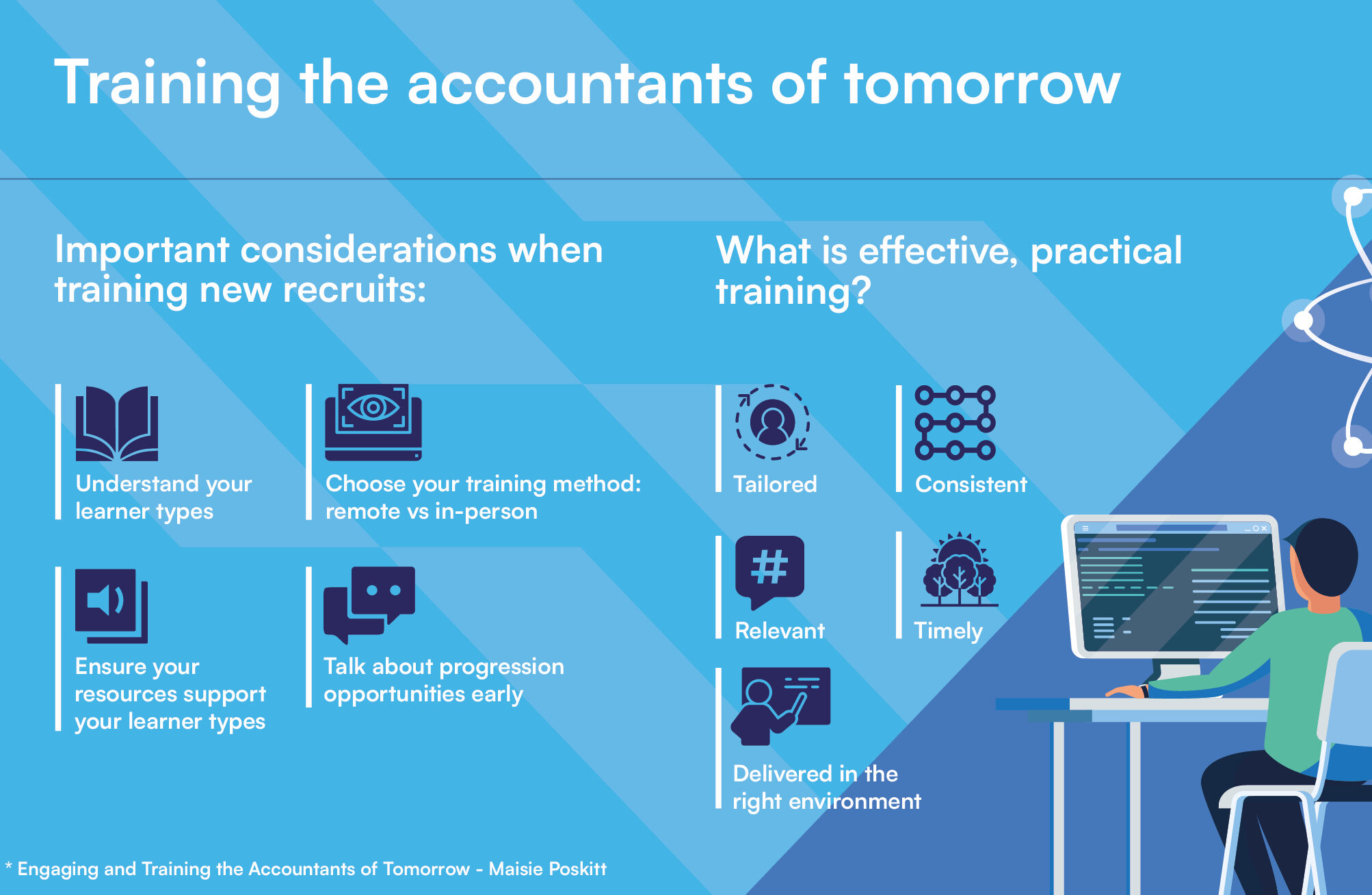I have been delving into some of the key findings from my report, Engaging and Training the Accountants of Tomorrow, and examining how the voices of Generation Z may be stereotyped and how they might be put off applying for accounting roles by leaders in the industry.
In my last blog, I spoke about the challenges of recruiting the next generation of accountants. This time, I wanted to focus on the importance of training and progression.
Different learning types
The first thing to remember when providing any sort of training is that everyone learns in different ways. Understanding each type of learner that you are trying to engage with will not only benefit them in terms of how they absorb the knowledge they need, but it will also help the broader team as you’re helping them to become the best employee they can be.
There are four main learner types – visual, auditory, reading and writing, and kinaesthetic. In my report, I spoke to 27 Gen Zs from BHP and found that the majority were kinaesthetic learners (they learn by doing). On top of being kinaesthetic learners, the younger generation prefer to learn in short snippets – this may be due to our diminishing attention spans or our love of getting a cup of tea between sessions!
If employers can determine methods of training based on learners’ preferred mode of learning, we may see improved knowledge retention.
Remote vs in-person training
I carry out all my training remotely as I am based at home; however, I can see the benefits of both remote and in-person training.
In person, you can establish more of a connection with the office environment in which you are learning, so on-the-job training works particularly well.
However, when I’ve invited a group of people to a training session in a meeting room, I often see herd mentality. I’ve established already that there are four learning types so, in a training room of 15 people, when one person starts writing notes, why does everyone else start doing the same?
Being in the office is certainly beneficial for soft skills such as phone calls and meetings. Just being close to someone on a phone call can encourage learning by osmosis – both good or bad.
People will naturally become more involved if they working closely alongside other people. How many Zoom meetings do trainees get invited to ‘just for the experience’? Probably not many. However, in an office environment, trainees will often be invited to attend meetings for the experience as they are on site.
I prefer to do larger training sessions remotely because everyone can watch the screen, focus on me and be less influenced by the other attendees. So the individual will make their own choice on how to learn. Often I see people change it up as I vary the topic, as some don’t just learn one way.
In the past, many believed that learning remotely creates barriers, but after a global pandemic remote working and training is increasingly seen as the norm.
To younger recruits, communicating via online platforms is second nature to them, so introducing technology such as Teams and Slack would not be a problem. Arguably they may even feel more comfortable sending a message rather than approaching someone in the office. Barriers are only noticed by staff if the leaders of an organisation perceive them to be there.
The way I see it, effective, practical training consists of five things:
- Tailored
- Right environment
- Consistent with how others work
- Timely
- Relevance
Learning materials
Different mediums support different learner types. Often I will receive requests for alternative support materials, which I always try to push out as quickly as possible. Remember that we are dealing with the ‘Google Generation’, so we need to ensure that all resources are easy to find.
Finally, never say ‘no’ to training. A ‘no’ to training is a ‘no’ to progression and will be viewed as a limitation by the younger generation.
Progression opportunities
When I asked my Gen Z focus groups what they wanted from their employer, clear development opportunities came in as the fifth most important benefit.
This comes as a surprise when you consider that the Gen Z stereotypes that came out of my survey group included ‘lazy’, ‘entitled’ and ‘need handholding’ – suggesting that they are not necessarily keen to progress in the workplace.
On the flip side, Gen Z and all future generations will need to be highly ambitious as they are try to outpace their peers and the ever-improving automation set to replace specific roles in the industry.
When hiring Gen Zs, you need to leave stereotypes at the door. You cannot lump your interviewees in with the rest of their generation, as they represent the most ambitious. If you don’t lose your preconceptions, you may be missing out on some great candidates.
It’s never too early to have a conversation around progression. If there is any doubt about a staff member’s future at your firm, the likelihood is that they won’t see a future and will be tempted by opportunities elsewhere.
To read my full report, click here.
This material is for informational purposes only and should not be relied upon as professional advice.



